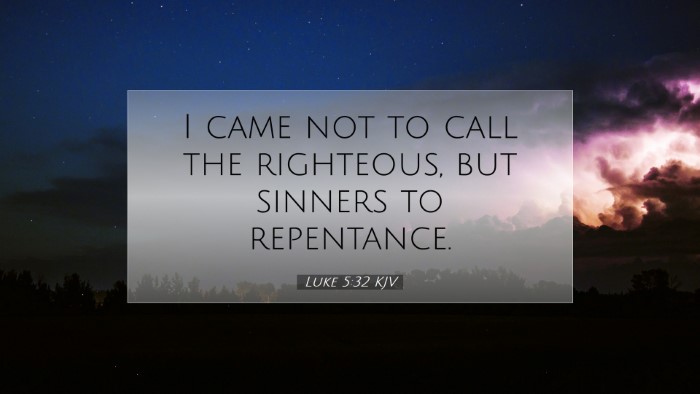Commentary on Luke 5:32
Verse: "I came not to call the righteous, but sinners to repentance."
Introduction
Luke 5:32 is a pivotal declaration of Jesus’ ministry, emphasizing His mission to the marginalized and the sinful. This verse succinctly captures the essence of the Gospel, where the grace of God is extended to those in greatest need of redemption. In examining this passage, insights from notable public domain commentators such as Matthew Henry, Albert Barnes, and Adam Clarke illustrate its theological depth and practical implications.
Contextual Analysis
The surrounding narrative in Luke chapter 5 presents the calling of Levi (Matthew), a tax collector. His immediate following of Jesus after the call marks a significant paradigm shift—indicative of Jesus’ ministry breaking societal norms. Henry notes that Jesus' association with sinners highlights the inclusiveness of His call, turning away from the self-righteous who believed they had no need for repentance.
The Meaning of "Call"
Jesus mentions the term "call," which is central to understanding His mission. According to Clarke, this call is not a mere invitation but carries the connotation of a directive from authority, emphasizing God's sovereignty in salvation. The righteous, as they perceived themselves, did not recognize the necessity of Jesus's call; their self-righteousness rendered them blind to their need for repentance.
The "Righteous" vs. "Sinners"
1. The Righteous:
- Henry posits that the "righteous" are those who trust in their own works and fail to recognize their spiritual poverty.
- Barnes expands on this notion, suggesting that the self-righteous often reject the call to repentance, believing their own adherence to the Law suffices for their salvation.
2. The Sinners:
- Jesus’ focus on sinners illustrates His mission. Clarke notes that sinners are those who acknowledge their failings and shortcomings, thus positioning themselves to receive grace.
- According to Henry, the acknowledgement of sin is crucial for understanding the need for salvation, unearthing the heart of God's purpose through Jesus’ earthly ministry.
The Call to Repentance
At the heart of this verse is the concept of repentance. Repentance is not merely feeling sorry for past transgressions but involves a radical reorientation of one's life toward God. Barnes defines repentance as an essential component of salvation—it is a change of mind that results in a change of action. The call to repentance suggests an active response to the grace offered by Christ.
Theological Implications
This verse emphasizes several key theological themes:
- Grace and Mercy: Jesus extends grace to those society deems unworthy. Clarke articulates that God's mercy is available to all who recognize their sinfulness.
- The Nature of Jesus’ Ministry: This declaration shapes the understanding of Jesus' mission as inclusive rather than exclusive. Henry highlights that Jesus came to save not just a select few but everyone who acknowledges their need for salvation.
- The Inclusivity of the Gospel: The inclusive nature of Jesus’ call demonstrates that the Gospel is not confined to the religious elite. Barnes emphasizes that the Church must mirror this inclusivity in its mission to evangelize.
Practical Applications
For pastors, students, and theologians, Luke 5:32 encourages a few practical applications:
- Acknowledge sin: Understanding that repentance is necessary is foundational for both personal faith and pastoral practice, fostering humility before God.
- Embrace the marginalized: Inviting those who feel disenfranchised by the Church to experience grace can enhance community outreach and discipleship.
- Preach repentance: It is crucial in our declarations of the Gospel to emphasize repentance, aligning with Jesus' own teaching.
Conclusion
Luke 5:32 encapsulates the essence of Jesus' mission to seek and save the lost. Insights from public domain commentaries elucidate the depth of this verse, revealing the contrasts between self-righteousness and genuine need for repentance. The call to repentance is an invitation to transformation—a core aspect of the Christian faith that should be embraced and shared widely. As we reflect on this profound statement, may we be inspired to extend the same grace and call to those around us, recognizing that all are invited into the redemptive narrative of Christ.


